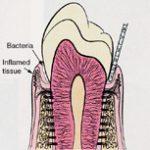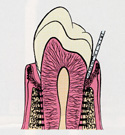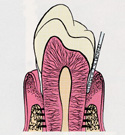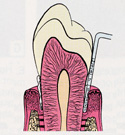Periodontal Disease
Types of Periodontal Disease
The most common forms of periodontal disease include the following.
Gingivitis
Gingivitis is the earliest and least destructive form of the periodontal diseases. It causes the gingiva (gums) to become red, swollen and bleed easily. There is usually little or no discomfort. Gingivitis is usually a result of inadequate oral hygiene and is reversible with professional treatment and good home care.

Aggressive Periodontitis
Formerly called Juvenile Periodontitis and Rapidly Progressive Periodontitis in Young Adults, aggressive periodontitis is a form of periodontitis that occurs in younger patients who are otherwise clinically healthy. It’s features include rapid loss of the attachment between the root and surrounding tissues and destruction of the supporting bone. This form of periodontitis appears to be associated with a genetic predisposition, i.e. family history.
Chronic Periodontitis
Chronic periodontitis is the most commonly occurring form of periodontitis. It is more slowly progressing than aggressive periodontitis. Once established, it causes inflammation within the supporting tissues of the teeth, progressive attachment and bone loss, and either pocket formation or recession of the gingiva. It is usually diagnosed in older adults, but can occur at any age. While attachment loss and bone loss usually occurs slowly, periods of rapid progression and abscess formation can occur.



Periodontitis as a Manifestation of Systemic Diseases
Periodontitis, while not caused by systemic diseases, may be exacerbated by systemic diseases that effect the immune system such as diabetes and AIDS. Evidence is also mounting that periodontitis may contribute to the pathogenesis of other health problems such as heart disease, diabetes, and low birth weight babies.
Necrotizing Periodontal Disease
An acute infection of the gingival tissues, periodontal ligament and alveolar bone, called Necrotizing Periodontitis, is characterized by necrosis of the infected tissue which is associated with pain, foul odor, and rapid tissue destruction. This disease is most commonly observed in individuals with systemic conditions such as AIDS (HIV infection), malnutrition and immunosuppression.
